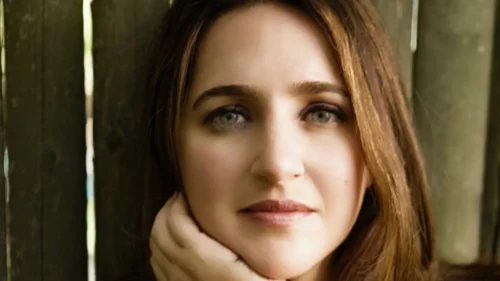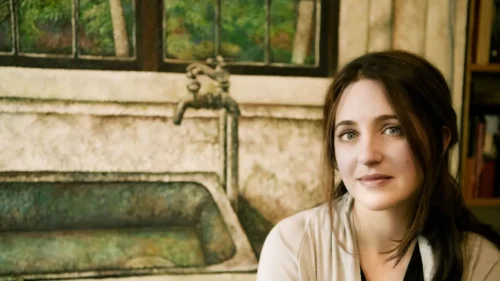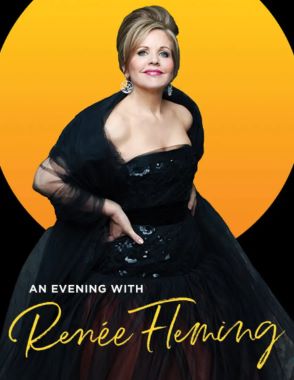SUBLIME STORYTELLING IN SONG
At the start of this event a voice reminded us to silence our cell phones and to refrain from talking or singing along. Lucky for the crowd I don’t know the lyrics to Penelope, the vocal-theatrical work by composer André Previn and playwright Tom Stoppard. Few would as this is the West Coast Premiere, having previously debuted in 2019 at the Tanglewood Music Festival in Lenox, Mass. In An Evening with Renée Fleming presented by LA Opera on June 10, 2023, guess who we heard introduce the piece to this coast, along with a miscellany of melodies?
 Renée Fleming (Andrew Eccles/Decca)
Renée Fleming (Andrew Eccles/Decca)The evening began with Penelope. Incomplete at the time of Previn’s death, his editor David Fetherolf completed the piece. Now in their final season of concerts, the Emerson String Quartet (Eugene Drucker violin, Philip Setzer violin, Lawrence Dutton viola, and Paul Watkins cello), pianist Simone Dinnerstein, and actress Merle Dandridge as The Narrator took their places as Renée Fleming entered wearing a long sparkling chain necklace and a strapless purple and black sequined brocade gown (perhaps a nod to the tunic Penelope dresses her husband in as he goes to war). Alternating in sections between the Narrator and the Soprano, both of whom portray the title character, the work felt disjointed and awkward at times. Dandridge, recently seen as Desirée Armfeldt in Pasadena Playhouse’s A Little Night Music, handled the sporadically witty feminist text with great humor and command, especially when she referred to Helen as “the village vamp,” “a hateful woman,” and a “slut.”
 Merle Dandridge makes her LA Opera debut as The Narrator in Penelope
(Wes Klain)
Merle Dandridge makes her LA Opera debut as The Narrator in Penelope
(Wes Klain)Musically, Fleming gets to express Penelope’s broad emotions over her twenty-year wait for her husband Odysseus to return from Troy. Her sweet and silky tones were lovely as she recalled her happiness to marry and “be in the lovely Greece.” When she remembered her husband building their marriage bed, a tender violin solo accented the moment he “put [her] on the bed” followed by the quartet playing fervently with quickening strokes. Penelope mournfully sings of the sorrow she felt as she dressed him to leave for Troy. The Narrator tells of various monsters and adventures Odysseus encounters over the course of “seven long years” as the piano score becomes hurried and tense, sounding like a silent film score. Penelope angrily sings “Where is he?” The Narrator calls him a “Bastard!” Fleming unleashes the dark chest tones of her voice in this section expressing Penelope’s frustration and longing. Ultimately, the husband returns and the strings suddenly sound like a an atmospheric film score and the text becomes a bit Narrator heavy. Odysseus gets angrily doubtful of Penelope’s faithfulness, it’s as if the piano emits a sigh. Fleming finesses her luxuriant velvety tones to reassure she was true only to him, singing the only resolved note in the piece, “Home.”
While the piece is dubious in its success, it is one that would benefit from repeated listening to better understand its structure and how it fits in with the narrative. Fleming’s glorious voice is what we were here to experience, and she did not disappoint.
 Renée Fleming (Timothy White/Decca)
Renée Fleming (Timothy White/Decca)Part II began with Fleming performing songs by two romantic composers and one contemporary. The soprano entered the stage in a sparkling strapless sea foam-green gown with a shimmering aqua satin swath in the skirt’s elegant geometric draping. The gown was befitting to the pieces, all having an oceanside setting. Her first song was “Lauf der Welt,” a folk song by 19th-century composer Edvard Grieg. Fleming’s bright and happy tone made for a refreshing change of mood. She followed with “Zur Rosenzeit,” also by Grieg. Fleming finessed the piece’s contrasting moments of mournfulness and hopeful remembrances, calling again upon her chest tones, this time in a gentler manner. Pianist Simone Dinnerstein played with grace and sensitivity.
 Simone Dinnerstein (Lisa Marie Mazzucco)
Simone Dinnerstein (Lisa Marie Mazzucco)Fleming then talked of how her visit to the Island of Nantucket and its Whaling Museum caused her to reflect on the wives of the whalers. Picturing them on the widow’s walk, not knowing if their husbands would return, was her inspiration to present these songs. She sang two songs by the French romantic impressionist composer Gabriel Fauré. “Les Berceaux,” about the wives of sailors left behind to rock the cradles while they seek their adventures, oft to succumb to the rocking cradle of the sea. Fleming’s lithe legato and heartfelt phrasing captured the essence of the piece. She followed with the composer’s short and lovely “Au bord de l’eau”; The love and longing in her voice and the music’s transportive quality took me to the “edge of the stream” sung in the lyrics.
 Renée Fleming (Andrew Eccles/Decca)
Renée Fleming (Andrew Eccles/Decca)“Evening” by Kevin Puts, the contemporary composer who also worked with Fleming on the Metropolitan Opera’s The Hours, was the final song in the set. The song’s lyrics expressing the angst and frustration that things continue despite death and suffering, “Moonlight pours down without mercy…” really drove home a plea for us to take notice that the ocean is reclaiming the land and islands, and that we are doomed and trapped here. This ecological cry-out reminded me of Olivia Newton-John’s emotional plea “The Promise (The Dolphin Song)” with its similar message. Fleming’s vocal artistry and emotional depth resonated in the piece. Curiously, a large moth entered the stage mid-song and fluttered around to the music as if choreographed to do so. It added a natural quality proper to the song, flying off before the conclusion.
 Simone Dinnerstein (Lisa Marie Mazzucco)
Simone Dinnerstein (Lisa Marie Mazzucco)
Next, Ms. Dinnerstein played the Philip Glass piece “Mad Rush,” originally written on and for the organ of the cathedral of St. John the Divine in New York City for the Dalai Lama’s first public address in North America. She shined spectacularly in this energetic, oft-times frantic piece. With its variance in intensity and tone she played with much finesse and sensitivity. It felt like a chase, a hurry-up and get somewhere with sudden contemplative moments of rest and reflection as if to ponder the question, “WHY?” I was delightfully surprised at how well I liked the piece and I thoroughly enjoyed watching Dinnerstein’s dramatic hand work.
Fleming returned to the stage to complete the program with three contemporary songs. The first of which was “I Have Dreamt” from Bernard Herman’s only opera Wuthering Heights. While she sang as beautifully as ever including bell-like high notes, the piece felt static and uninspired. She next sang the beautiful “All the Things You Are” by Jerome Kern and Oscar Hammerstein. Using a microphone and a more cabaret-like style of singing made the song more conversational and its lyrics intelligible. The arrangement played around with the melody at the end resulting in some varied showiness.
Lastly, she sang “I Want Magic” from André Previn’s opera A Streetcar Named Desire. Having created the role Blanche, she sang it well. Yet while the lyrics make sense with the character, I am not a fan of the atonality often heard in modern operatic works.
She then performed two encores for an appreciative audience. The first was “Hallelujah” written by Canadian singer Leonard Cohen. Interestingly, Fleming announced that Rufus Wainwright, one of the artists who has recorded the song, was in the audience. She invited us all to sing along so, with only one lyric to remember, I did. She finished the sublime evening inviting Merle Dandridge back to join her in the Burt Bacharach classic, “What the World Needs Now Is Love.” And isn’t that the truth?

